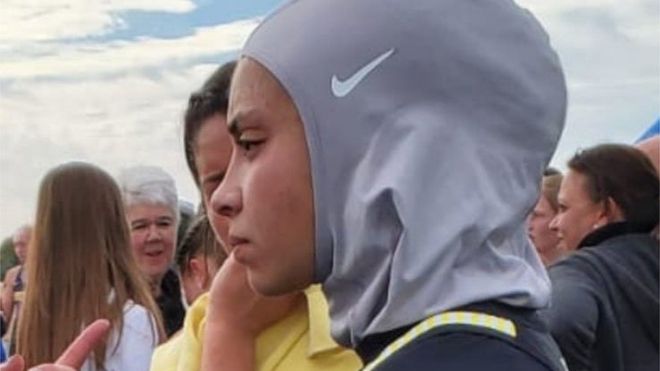A teenage Muslim athlete in the US state of Ohio has told of her devastation at being disqualified for wearing a hijab during a race.
Noor Abukaram, 16, said she was not warned her attire was against the rules until after crossing the finish line.
Amid outcry, the Ohio High School Athletic Association (OHSAA) says it is looking into changing its religious waiver rules for next season.
Her story sparked a national discussion about dress codes and discrimination.
Noor had been running for the Sylvania Northview school team all season, and her hijab – a head covering worn by some Muslim women for religious reasons – had never been an issue before the district level race in on Saturday in the city of Findlay, 135 miles (220km) west of Cleveland.
Noor wrote in a Facebook post after the event that when the officials inspected her team, they informed one of her teammates that her shorts were in violation of the rules and allowed her to change.
But they did not say anything to Noor about her Nike athletic hijab, though she said she saw her coach discussing something privately with the officials.
After finishing the 5km race with her personal best time of 22 minutes and 22 seconds, Noor was surprised to find her name was not on the score boards.
Her teammates then told her she had been disqualified.
“When I found it was because of my hijab, I felt like I had got hit by a truck and punched in the gut,” Noor told the BBC.
“Being disqualified because of my hijab – it’s not because they’re looking out for my safety, or because they are concerned that I have an advantage, because I definitely don’t have an advantage wearing my hijab.
“I think it’s discriminatory against my religion.”
Noor says she felt “humiliated” after the race, especially since the officials said nothing to her beforehand.
“I looked like a clown running that race and I only ran it for those officials,” she said.
Her coach had failed to submit a religious waiver for the Saturday race, but has since filed one for Noor’s upcoming regional competition this weekend, and OHSAA has accepted it.
While the association’s rulebook does not specifically mention hijabs, it states religious headwear requires a waiver, local media report.
An OHSAA spokesman told the Associated Press that they have previously considered dropping the religious waiver requirement, and the issue is being taken seriously in light of this incident.
The spokesman also noted that the rule is not always enforced, including in some instances of runners wearing hats in cold weather.
Noor believes no one should have to sign a waiver for something like a hijab.
“They don’t need to alter the course for me specifically. I’m running just like everyone else, I’m starting on the same start line and finishing on the same finish line.”
But she says that she’s seen a lot of positive feedback from her community – and across the US. Her cousin’s initial Facebook post sharing Noor’s story had over 2,000 likes and 3,000 shares as of Friday.
“I’m really happy that I decided to let this story go public because it really brings out a dialogue, and a lot of different people have been reaching out to me saying that similar things have been happening to them.”
On Thursday, Massachusetts senator and 2020 Democratic hopeful Elizabeth Warren also weighed in, saying: “Muslim students should never be denied participation in school activities.”
Controversy surrounding around athletes and hijabs is not new.
Last year, a 16-year-old basketball player in Philadelphia, Pennsylvania, was made to leave a game over her hijab, which prompted a statewide rule change.
Female athletes in particular have been singled out over strict dress codes.
Last month, a teenage swimmer in Anchorage, Alaska, was disqualified after winning a race on the grounds that her school-issued swimsuit had exposed too much of her bottom.
The decision was overturned following public outcry.
